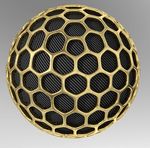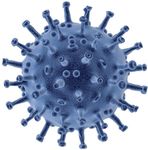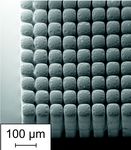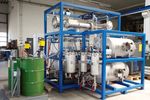NINa-News North German Initiative Nanotechnology SH No. 12 | March 2020 - NINa SH eV
←
→
Page content transcription
If your browser does not render page correctly, please read the page content below
NINa-News
North German Initiative
Nanotechnology SH
No. 12 | March 2020
www.nina-sh.de
Dear Reader,
the Corona crisis makes us New bat-
aware of how existentially tery systems, how-
mankind depends on effec- ever, are only useful
tive methods to counteract and sustainable if they can
microbiological hazards. be manufactured on an industrial
Irrespective of the new vi- scale and if the resource cycles can be closed by
rus, it has been suspected re-use and recycling. These aspects of energy storage are
for some time that the ac- investigated by Fraunhofer ISIT for a multitude of battery
cess to clean drinking water different applications, besides the development of inno-
will be a potential reason for vative micro- and nanotechnologies (see page 2). We are
violent conflicts. The Fraun- especially looking forward to welcoming the federal minis-
hofer Institute for Silicon ter of education and research Anja Karliczek and the min-
Dr. Axel Müller-Groeling Technology ISIT in Itzehoe ister-president of Schleswig-Holstein Daniel Günther at
(Germany) uses its tech- Fraunhofer ISIT. For us, their visit underlines the relevance
nological expertise to deliver relevant solutions for such of our research and development activities.
fundamental challenges. Amongst others we currently de- Mankind currently faces challenges of hitherto un-
velop, together with the company Condias, a miniaturized known scale, on a short term with the spreading new dis-
module for the disinfection of surfaces and the prepara- ease and on a medium term with the climate change. New
tion of clean drinking water. technologies, from Schleswig-Holstein,too, will form the
Although the world is currently focused on the virus-cri- basis for the solutions to these historic challenges. Howev-
sis, climate change remains a great challenge of mankind er, at the end of the day, every single one of us is respon-
with unpredictable future impact. Two key areas for the sible for our collective success due to individual decisions
decrease of climate changing emissions are power gener- and actions. No technology will ever replace willingness
ation and storage. Research in these fields is conducted in to co-operate, solidarity or humanity. Let us face our re-
the state of Schleswig-Holstein on international top-level: sponsibility and use the upcoming technologies to shape
the Helmholtz Centre Geesthacht a future worth living.
is already well established in
the field of automobile hydro-
gen technology. It will now
be joined by the new Insti-
tute for Maritime Energy Dr. habil. Axel Müller-Groeling
Systems of the German Head of the Fraunhofer Institute for Silicon Technology ISIT
Aerospace Center
(DLR). Stühff GmbH
demonstrates how
SME in Germa-
ny benefit from
green nanotech-
nology in such an
innovative setting (see
page 3).
Pouch cell manufactured at ISIT.
1Disruptive Technologies made in Itzehoe
Novel transistors, innovative batteries and new dis-
ruptive materials - the Fraunhofer Institute for Silicon
Technology ISIT in Itzhehoe, Germany, develops the
technologies for tomorrows microsystems and power
electronics.
Routine measurements should determine the elec-
trical voltage at which thin layers of aluminum-scandi-
um-nitride break down. The involved scientists of Kiel
University and Fraunhofer ISIT did not suspect that they
will make a revolutionary finding. Which happened when
they observed a change in the crystal structure of the ma-
terial, indicating so-called ferroelectric properties. Axel
Müller-Groeling, head of ISIT, is excited, “We just start to
identify all the possible new applications in transistors, The Fraunhofer ISIT develops and manufactures innovative
actuators and many other technological areas. We have microsystems in a dedicated clean room area of 1000 m².
to establish manifold co-operations worldwide even just
to explore the huge innovation potential of the material.” a multitude of applications,” says Lisec. The technolo-
The ISIT is already member of the unique competence gy is already in use for the development of a DNA-con-
network Research Fab Microelectronics Germany (FMD) centrator for a medical quick test and in an energy har-
which offers cutting-edge technologies along the whole vester which converts vibrational into electrical energy.
value chain. Within FMD the ISIT contributes solutions However, the innovative process can yield solutions for
for mega trends, like the development of LiDAR-Sensors many other applications thanks to the wide choice of ma-
for autonomous driving. terials, the geometrical degrees of freedom and the po-
The aim of all development activities at ISIT is a smooth rous structure of the solids. Microfilters, magnetic drives
transfer into industrial production. Pilot series can even and sensors as well as thermal insulation for microsys-
be manufactured at the institute, if production capabili- tems will be addressed to name but a few.
ties are not available otherwise. Besides a multitude of Dr. Lisec resumes, “Our new technology has disruptive
standard clean room processes, ISIT utilizes four innova- potential for the next generation of microsystems. We
tive technology platforms to realize complex microsys- are currently establishing
tems: piezoelectric aluminum-scandium-nitride, epitaxial co-operations with other
poly-silicon, glas flow processes and a new agglomeration research institutes and
process to integrate microstructures of various materials. companies worldwide to
“The integration of three-dimensional structures into realize innovative tech-
microsystems was almost impossible until now,” explains nical solutions.”
Dr. Thomas Lisec, the inventor of the technology. “We Hightech made in
realize stable microstructures by agglomerating powders Itzehoe as a driver for
of various materials with a nanometer-thin skeleton. This innovation - a worldwide
process provides us totally new degrees of freedom for export hit.
The innovative agglom-
eration process en-
ables the integration of
three-dimensional com-
ponents into microsys-
tems. Depicted are
micromagnets which
©Fraunhofer ISIT
can be used in sensors
and actuators, among
others. ISIT is currently
the only provider of the
ISIT‘s technology platforms are united in precisely con-
technology.
trollable micro mirrors for various applications like
LiDAR-Sensors for autonomous driving.
2Fossil-free energy thanks to hydrogen technology
from Geesthacht
From extended workbench to system manufacturer for a
sustainable energy supply based on hydrogen - the com-
pany Stühff GmbH in Geesthacht demonstrates how SME
in Germany can utilize green nanotechnology to create
jobs and access new markets.
Globalization does not even spare formerly
well-working business models of long-standing com-
panies. Thus Holger Stühff, CEO of Stühff GmbH in
Geestacht, had to find an answer to the ever increas-
ing price pressure of the international competition.
He managed to differentiate from the competitors by
focusing on special materials and respective welding The Stühff GmbH possesses extensive experience in the realization
processes. However, Mr. Stühff wanted to establish an of complex systems for various industries. (© Stühff GmbH)
own product to become more independent with his
company and got in touch with the Helmholtz-Cen- “A consortium combining operators of wind ener-
ter Geesthacht (HZG) in 2005. “Back then hydrogen gy plants, utilities and our hydrogen system should be
did not enjoy much political tailwind as an alterna- formed with political support in order to gain oper-
tive green fuel. Things have changed in the meantime ating experience under realistic conditions. The time
since people realized that solely battery-based ener- has come for the metal hydride technology of the HZG
gy storage will not suffice for the transition to a fos- to enter the market,” believes Stühff. In this case his
sil-free energy supply.” company will have found its own product with the
The relevance of Geesthacht as a hub for green hy- integration of complete systems for the generation,
drogen technology is demonstrated by the upcoming storage and usage of green hydrogen.
foundation of a new institute for maritime energy
systems by the German Aerospace Center (DLR). Mr. For the green energy transformation the state of
Stühff is convinced that valuable synergies will arise in Schleswig-Holstein does not only provide the wind but
between the new institute and the distinct competen- also the necessary high-end technologies.
cies of the HZG. Currently his company co-operates
with the HZG in two projects for the development of
mobile and stationary hydrogen tanks with nanostruc-
tured metal hydrides. Scientists of the HZG around
Professor Thomas Klassen recently managed to dras-
tically decrease the loading time of metal hydride hy-
drogen tanks thanks to optimized nanocomposites.
“Our innovative technology for mobile hydrogen
storage differs fundamentally from other current ap-
proaches. I believe the system to be very promising,”
says Stühff. Vehicles achieve a range of 500 km with
the new hydrogen system at refueling times of only a
few minutes.
Even closer to the market entry are stationary hy-
drogen installations. “It is about time to take the next
step. The system should be used to demonstrate the
permanent sustainable energy supply of a community
by a combination of wind energy and hydrogen stor-
age.” The developed system can balance fluctuations
of green power supplies with a storage capacity of 50
kg hydrogen and a fuel cell with 70 % efficiency.
3NINa in times of Covid-19
Nano Meets Medicine | NINa SH general meeting | NIBS 2020
Like many others, NINa SH have to shift their events due to the Corona crisis.
A summary of the major changes.
The focused meeting form about the new dates timely.
Nano Meets Medicine offers The international confer-
experts from nanotechnology ence Nanotechnology and
and medicine the opportunity Innovation in the Baltic Sea
for exchange and initiation of med- Region (NIBS) 2020, which
ical innovations. The focused meeting was planned in the city of
is organized by the institute of medical engineering of Hamburg in June, unfortu-
Lübeck University, NINa SH and Life Science Nord. The nately has to be canceled.
focused meeting, together with NINa SH’s general meet- The next NIBS conference
ing, could not take place as scheduled in March. Both will take place in 2021.
events will be held later this year and NINa SH will in- Until then stay well and fit!
NINa‘s Highlights
On this page, NINa SH presents recent highlights from the field of nanotechnology and news from science and
industry. You can inform the network about your activities here, too. Send your highlight to info@nina-sh.de.
Additive manufacturing in medical engineering
9 .- 11. September 2020 | conference | Lübeck, Germany
3D printing yields enormous advantag- tists, technicians, practitioners and
es for medical technology like prosthe- entrepreneurs who are involved in
ses or matrices for tissue engineering. 3D printing in medical applications.
The second international conference Further information are provided
Additive Manufacturing Meets Med- on the website of the conference
icine is a hub for engineers, scien- www.ammm.science
Save-the-date: nano imaging workshop at European XFEL
10. September 2020 | workshop | Hamburg, European XFEL
The workshop aims at linking the top- tific results as well as to network with
ics “nano” and “imaging” for users of experts on x-ray based imaging tech-
x-ray based in the fields of medicine, niques. The workshop is organized
© European XFEL
industry and science. The workshops jointly by European XFEL, NINa SH, Ini-
offers participants the opportunity to tiative Bildverarbeitung e.V. and WTSH
communicate latest trends and scien- GmbH.
Aero-material made of 99,99% air for laser illumination
Although lasers are highly efficient light cations on nanostructured aero-boron-
sources they are usually not suitable for nitride which strongly scatters light due
illumination applications due to the high- to its extremely porous structure. The
© Florian Rasch
ly directed light output. Scientist around researchers are now looking for partners
Professor Rainer Adelung from Kiel Uni- from industry to integrate the new mate-
versity now report in Nature Communi- rial in illumination systems.
Imprint Prof. Dr.
Franz
Franz
Faupel
Faupel NINa SH e.V. is
istaein
registered
eingetragener
societyVerein
basedmit
in Kiel,
Sitz Germany.
in Kiel.
Publisher:
Herausgeber: Lehrstuhl für Materialverbunde Vereinsregisternummer:
Registration number: VR VR 6231
6231
KI KI
Norddeutsche Initiative Nanotechnologie Institut für Materialwissenschaft Gläubiger-Identifikationsnummer:
Creditor identification number: DE75ZZZ00001501537
DE75ZZZ00001501537
Schleswig-Holstein e.V. Kaiserstraße 2 Verantwortlich
Responsible in the
im Sinne
sensedes
of German
Presserechts:
press law:
www.NINa-SH.de 24143 Kiel,
Kiel Germany Der geschäftsführende
The board of directors. Vorstand.
4You can also read



























































